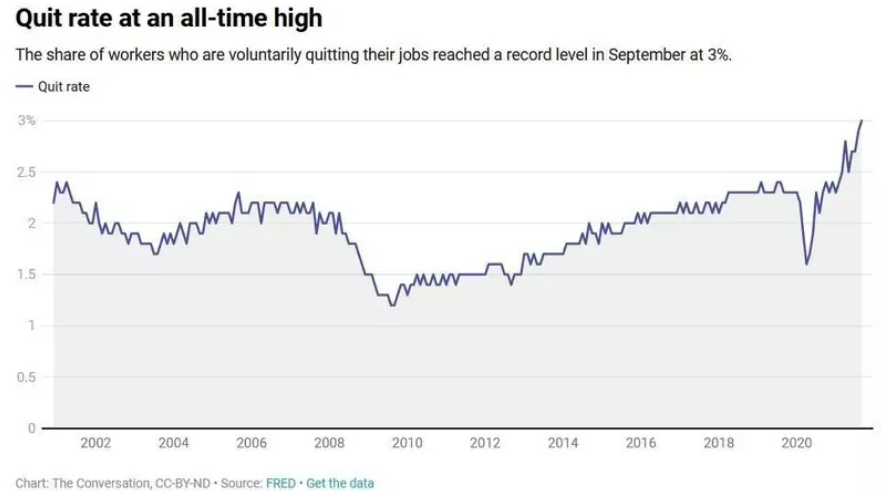Professional networking refers to the deliberate effort to build meaningful and lasting professional relationships. The concept of networking is familiar to many, and many know it’s something they should be doing.
However, networking often means different things to different people, leaving most feeling unsure how to do it effectively or without feeling awkward…

Whether you want a new job or a promotion, role, strategic networking can open the doors you didn’t know existed. . In other words, networking, when done right, should be an ongoing and evolving practice.
Why professional networking still matters
The past two years have been difficult for many people worldwide. With a global pandemic raging and government restrictions on movement bringing economic activity globally to a sudden stop, many people found themselves out of a job.
But something else happened. Interestingly, the pandemic seems to have precipitated significant volatility in the global labor market. Specifically, many people, especially in the United States, quit their jobs in 2021.

According to figures from the US Bureau of Labor Statistics, more than 4 million workers resigned in July 2021 alone. Some have called the phenomenon the ‘Great Resignation.’ In an analysis, the World Economic Forum (WEF) found the highest resignation rates among mid-career employees, those who often question if their current job fits their purpose in life.
One thing is crystal clear from the phenomenon – many people are out there looking for jobs. Oddly enough, employers are hiring at unprecedented rates. But, there’s a big BUT here. Just applying online to job after job with the same CV isn’t enough. Most online systems will automatically reject the application. ,
Instead, you need to be strategic in how you position yourself against the competition – the other highly qualified individuals who may have even more experience than you!
Those who spend lots of time building trust and long-term professional relationships beyond superficial trading of favors will be much more successful in landing their next opportunity!
This is why networking is more important than ever right now.
Struggling To Secure That New Career?
Whether you’re trying to change industries, or simply find a new job, my quiz will help you find your biggest bottleneck and show you how to solve it 👇
Core benefits of professional networking
Other than getting a new and better job faster than an average job seeker, networking offers several other benefits, including:
Building a circle of trusted advisors in your professional network
If you are ever feeling stuck or need professional guidance (and don’t want to go to your boss), having a strong network of mentors or professional advisors can help you navigate complex or sticky work situations. They can serve as a sounding board, offer a different perspective, or connect you with new resources. They can also serve as a solid sense of support.
Learn about an alternative career path
There may come a time in your career when the need for a career switch becomes urgent. Perhaps this is one of the greatest driving forces behind the Great Resignation in 2021 as being locked up at home forced a lot of people to re-evaluate their career choices. However, how do you go about identifying a career path that might be more fulfilling?
Building and maintaining a strong professional network will enable you to meet new people you may not have otherwise met. One introduction can lead to six new introductions which can lead to a new opportunity.
Networking outside of your current company (or even industry) will also help to broaden your horizons and potentially find new passions.
Be the first to learn about open positions that might interest you
The job market is awash with talented and hardworking people in the wake of the Great Resignation. In such cases, it isn’t easy to be the first one to hear about a vacancy, especially when advertised in mass media.
How, then, can you get ahead of the competition?
Well, imagine if you had already built a relationship with hiring managers at a range of companies. There’s a good chance they might come to you first, especially if they know you’re open to opportunities and already have a matching skillset.
That’s exactly what networking can do!
Professional networking tactics & strategies
While establishing connections builds the foundation crucial, the most critical part of professional networking is maintaining your relationships.. For instance, a connection wouldn’t be helpful if you do not interact for years and then send an email ten years later, “It’s been so long since we’ve last been in touch. Ten years actually.” Moreover, such contact might not help you jump through hoops when needed. So, how do you build a solid network you can rely on throughout your career?
1. Be present at networking events
A networking event might take different forms, but, typically, it is a conference wherein keynote speakers and attendees connect. The event might involve a single organization, where the goal is to increase inter-organizational fraternity. It could also involve people from different organizations who work in similar industries.
These kinds of events can often feel awkward and uncomfortable, especially if you are an unprepared nervous-nelly. That’s why it’s always worth brushing up on your elevator pitch before events. In a nutshell, you will want to be able to explain what you do and the problems you solve, in a clear and concise way.
You will also want to be prepared to ask questions and learn about the person you are talking to. For example, what’s important to them, what keeps them up at night, and what are their main professional challenges?
Once the event is over, you will want to follow up and continue to build that relationship. Maybe you spot an opportunity to connect them with someone else or to help solve a problem they mention. This is exactly the kind of thing that will keep you front of mind should any potential career opportunities open up.
But what if you hate the thought of attending in-person networking events? Well, you’re not alone and it just so happens there is another way…
2. Maintain regular activity on relevant digital platforms
If you feel a little anxious about in-person networking events, using digital platforms can be a great place to start laying early foundations for networking.
With several social media platforms competing for your precious minutes, it can be hard to find the one app to use for networking purposes. Luckily, LinkedIn developers were gracious enough to create a platform where professionals from all over the world can meet and interact effortlessly.
To use LinkedIn effectively, do the following:
- Optimize your LinkedIn profile by completing all the required steps. A complete profile will expose you to many potential connections.
- Start talking to new connections using direct messaging.
- Actively share your ideas through regular posts and hashtags.
- Engage with others’ posts by commenting and sharing your thoughts.
- Be sure to keep in touch with connections by congratulating them on key events like promotions (LinkedIn will also often notify you of this).
- Give endorsements/recommendations and accept those from connections.
- Do not ask contacts for a job.
- Spell check everything and anything you post, including your profile.
You’ll also want to check out my guide on how to get hired on Linkedin.
3. Be ready to share your knowledge
LinkedIn is not the only place to build your network online and demonstrate your knowledge. You can share knowledge with your contacts through regular Twitter threads or blog posts on your website. The idea here is to build your awareness amongst companies and recruiters. Should an opportunity arise, one of your connections might even end up recommending you based on the content you’ve shared.
If you’re worried that you don’t currently have the relevant knowledge and expertise, don’t worry! You can always consider volunteering with a professional association, attend webinars and take online certifications. This can go a long way to developing your knowledge whilst also expanding your credentials.
4. Always return favors
When receiving help, it is worth noting that someone somewhere went out of their way to make it possible. Similarly, be ready to come through for your networking contacts when needed, even if it’s something as simple as making an introduction. It’s also worth keeping an eye out for opportunities to add value to your network. For example, if you stumble across a post or article you think could be of value, don’t be afraid to share it with them! You can also join your alumni association and participate in online mentoring and networking with other alums and students., helping to facilitate introductions, offer internships, and share professional advice.
Tips to make the most of professional networking
It’s not enough to know how to build a professional network. You must also know how to leverage your connections for the best results
However, it’s all about balance here!
If all you do is ask your network for favors, they’ll soon grow tired of you. Make sure you’re constantly feeding the relationship by adding value using some of the methods we mentioned above.
1. Have clearly defined goals
Whether attending a large event or scheduling a coffee meeting, take some time to think about what you hope to accomplish. Do you just want a fun night out to socialize? Do you want to meet three new people? Do you want advice on a particular topic? Do you want an introduction to two new people? Do you want to learn how to make yourself more marketable for your next role or learn about a new field? To maximize your time, you will want to know your goals upfront. The last thing you want is to have someone ask you, “How can I help you” or “What do you want to do?” and not have a solid answer. These people are busy so you’ll want to do your homework upfront. Research conference panelists ahead of time. Decide who you want to meet and what one or two questions you’ll want to ask.
2. Reach out and keep in touch
The first step to building a relationship is taking that first step and reaching out to someone, even if they may not initially be the right person. Take a step out of your comfort zone and strike up a conversation. Schedule a follow-up coffee. Ask questions about the other person. Learn about their pain points. After the meeting, follow up. And then, always, always, Always keep in touch with your contacts. The less time between communication, the more solid a relationship will become. Set up Google news alerts with their name so you can message them when they are quoted in a news article or get a promotion or award.
3. Stay relevant
Most people accept the request for a connection for different reasons. For example, the latest contact in your network liked the ideas you shared in a post. However, people can get bored very quickly.
What should you do in such a case? The best technique you can use to retain as many quality connections as possible is to stay relevant. This means learning new things every day, staying on top of trends in your profession/industry and expanding your horizons. You can set up Google news alerts on particular topics in your field to stay current or join a professional association and attend continuing education events
Not Sure Where To Start? 😖
Whether you’re trying to change industries, or simply find a new job, my quiz will help you find your biggest bottleneck and show you how to solve it 👇
